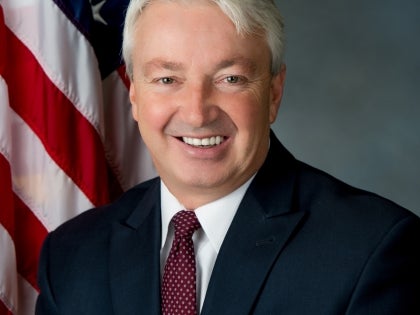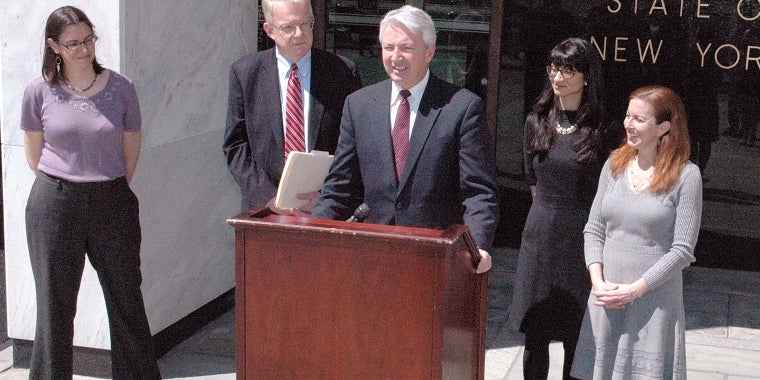
Senator Boyle & Assemblyman Sweeney Lead Charge to Remove Toxic Chemicals from Kids’ Products

‘Child Safe Products Act’ Legislative Sponsors Champion Fight for Passage in 2013
Mineola—Thousands of toxic chemicals, most untested for safety purposes, are being used to make everyday children’s products, such as car seats, toys, and bedding.
Senator Philip Boyle (R-Babylon) and Assemblyman Robert Sweeney (D-Lindenhurst), the lead sponsors of the Child Safe Products Act (A.6328/S.4614), announced that the bill has passed the Assembly and are calling on their colleagues in the Senate to pass this important legislation.
The bill identifies the most dangerous chemicals, begins a phase-out of these chemicals in 2018, and has broad support in the health, environmental and business communities.
Joining the legislators in their call for action were representatives from the state’s environmental and public health communities, including the Huntington Breast Cancer Action Coalition, Environmental Advocates of New York, Clean and Health New York, and Citizens Campaign for the Environment.
Senator Boyle said, “We need stricter regulations to ensure that our children's products are free of dangerous toxic chemicals. Our Child Safe Products Act calls for a method of identifying chemicals that are potentially harmful to children, notifying the public, and discontinuing their use.”
Assemblyman Sweeney said, “Parents are not aware that some of the products they give their children are made with toxic chemicals. Our legislation lifts the veil, requires the most dangerous chemicals to be removed and provides for the disclosure of products in which other dangerous chemicals are used. Manufacturers will feel the public pressure to switch to safe alternatives. I am proud that the Assembly passed this bill with overwhelming support, and look forward to its passage in the Senate this year.”
Saima Anjam, government affairs associate for Environmental Advocates said, “Parents buy products because they assume they are safe and the chemicals used to make them have been vetted, but that is often not the case. In the past when a chemical was banned from use, companies could simply switch to another equally toxic chemical. This bill sets forth a comprehensive plan to keep parents informed, and removes unnecessary toxic chemicals from the products they give their children. Environmental Advocates applauds Senator Boyle and Assemblyman Sweeney for their leadership and support in passing this common-sense legislation.”
Karen Joy Miller of the Huntington Breast Cancer Action Coalition and Laura Weinberg of the Great Neck Breast Cancer Coalition said, "There is an ongoing effort to bring current science-based information regarding toxic environmental exposures to the community enabling them to make healthy decisions for their families. The Child Safe Products Act is an important step toward informing consumers about the chemicals that are contained in products used by their children. As the community partners working with Principle Investigators Susan Teitelbaum, PhD, Associate Professor and Jia Chen, ScD, Professor, at the Icahn School of Medicine at Mount Sinai, we are thoroughly convinced that chemical exposure during sensitive windows of susceptibility (WOS) place the most vulnerable of our population, namely children, at risk.”
Bobbi Chase Wilding, deputy director of Clean and Healthy New York said, “Toxic chemicals have no place in our kids' products. New York's children deserve to be healthy and safe. It's a no-brainer. But the way things are now, parents are in the dark and children are unprotected. It's clearly time for the Child Safe Products Act. Clean and Healthy New York thanks Senator Boyle and Assemblyman Sweeney for championing this vital legislation. We applaud the Assembly for passing the bill, and call on the Senate to move quickly to pass it as well.”
Adrienne Esposito, executive director of Citizens Campaign for the Environment said, “The revolving door of toxic chemicals in children’s products must be stopped. The cycle of replacing one toxic chemical with another merely renders parents confused and puts our children’s health at risk. Citizens Campaign for the Environment commends Senator Boyle and Assemblyman Sweeney for fighting for a holistic approach to make children’s products safe once and for all, and call for the swift passage of the Child Safe Products Act.”
David Levine, CEO of the American Sustainable Business Council which, along with its member organizations represents over 165,000 businesses, including 25,000 in New York, said “Passing the Child Safe Products Act just makes good business sense. It protects shareholders, workers, and company brand name, while restoring consumer confidence in product safety, which will lead to greater profit and business and job growth.”
Caitlin Pixley, conservation associate of the Sierra Club Atlantic Chapter said, “The Sierra Club Atlantic Chapter has been working on toxics issues for quite some time as part of the JustGreen Partnership, and Senator Boyle and Assemblyman Sweeney's introduction of S.4614/A.6328 is a wonderful step forward in working to protect our children and our environment from toxic chemicals. Whether at the production, consumption or disposal-level, toxic chemicals find their way into our everyday environment, including our air, water, and natural places. The 36,000+ members of the Atlantic Chapter thank Senator Boyle and Assemblyman Sweeney for supporting this extremely important issue and for their dedication to NY's children and NY's environment.”
Russ Haven, NYPIRG Legislative Counsel said, “Senator Boyle and Assemblymember Sweeney deserve huge props for advancing a bill that puts children's health before the interests of the toxic chemical industry. The Child Safe Products Act will end the use of New York's children as 'canaries in the coal mine' to detect toxic chemicals in everyday products.”
Cecil Corbin-Mark, Deputy Director of WE ACT for Environmental Justice and co-leader of the Just Green Partnership said, “Low income communities and communities of color across New York are lucky to have leaders like Senator Boyle and Assemblyman Sweeney. The Child Safe Products Act that they introduced will put an end to toxic toys on the shelves of 99 cents stores in our neighborhoods.”
About the Child Safe Products Act
This bill amends the Environmental Conservation Law to better regulate use of toxic chemicals in children’s products. It will set up an infrastructure within state government to identify chemicals of concern, prioritize them based on the likelihood for children to be exposed to them, and require disclosure by children’s product manufacturers as to whether their products contain chemicals of concern. The bill will phase out priority chemicals in children’s products starting on January 1, 2018. This legislation also enables the Department of Environmental Conservation (DEC) to have the Interstate Chemicals Clearinghouse collect, manage, and publish the data collected from manufacturers.
Currently, New York State looks at chemicals individually to identify and restrict use of dangerous substances, despite more than 80,000 chemicals currently in use in the marketplace.
Children are also more susceptible than adults to the harmful effects of smaller amounts of chemicals, due to their developing systems. A 2005 study of industrial chemicals conducted by the nonprofit research organization, Environmental Working Group, detected 287 chemicals and pollutants in umbilical cord blood, 180 of which cause cancer, 217 that are toxic to the brain and nervous system, and 208 that cause birth defects or abnormal development in laboratory tests.
When safer substitutes are available, use of high concern chemicals in children’s products should be restricted. The passage of this legislation will help parents make informed decisions about which products may be dangerous for their children, and will help protect children from avoidable diseases and disorders, many of which have lifelong consequences.
Several other states, including Connecticut, Maine, Minnesota and Washington have adopted similar policies.

